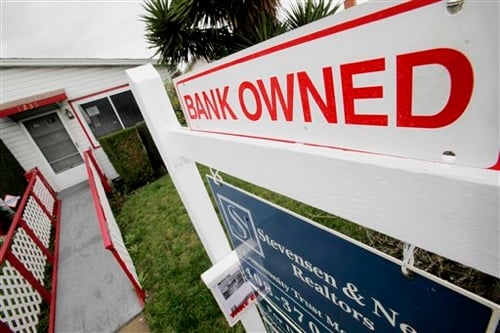Regulators shut four banks from California to Florida on Friday, boosting to 20 the number of U.S. bank failures this year following the 140 closures last year in the worst financial climate in decades.
Regulators shut four banks from California to Florida on Friday, boosting to 20 the number of U.S. bank failures this year following the 140 closures last year in the worst financial climate in decades.
The Federal Deposit Insurance Corp. took over La Jolla Bank, FSB, in La Jolla, Calif. The bank had 10 branches and about $3.6 billion in assets and $2.8 billion in deposits.
Also seized was George Washington Savings Bank in Orland Park, Ill. It had four branches and about $412.8 million in assets and $397 million in deposits.
The FDIC said OneWest Bank in Pasadena, Calif., agreed to assume all deposits and essentially all assets of La Jolla Bank. The takeover is expected to cost the deposit insurance fund an estimated $882.3 million.
The FDIC and OneWest will share losses on about $3.3 billion of the failed bank's loans and other assets.
Meanwhile, FirstMerit Bank, National Association of Akron, Ohio, agreed to take over deposits at George Washington Savings Bank. FirstMerit is also taking over essentially all the assets. For George Washington, the FDIC predicts the takeover will cost the insurance fund $141.4 million.
The loss-sharing agreement for George Washington covers $324.2 million in assets.
The other seized banks were smaller and located in Florida and Texas. They were Marco Community Bank, with a single office on Marco Island, a wealthy barrier island near Naples on Florida's Gulf Coast, and La Coste National Bank of La Coste, Texas.
Marco Community Bank had about $119.6 million in assets and $117.1 million in deposits. Mutual of Omaha Bank, a division of the big insurance company Mutual of Omaha, agreed to assume the assets and deposits of Marco Community Bank.
The failure of Marco Community Bank will cost the deposit insurance fund an estimated $38.1 million.
In addition, the FDIC and Mutual of Omaha Bank, which is based in Omaha, Neb., agreed to share losses on $104.8 million of the failed bank's loans and other assets.
Florida is among the states with the highest concentration of bank failures and where the meltdown in the real estate market brought an avalanche of soured mortgage loans. Last year saw the failure of 14 banks in the state. Also high on the list are California, Georgia and Illinois.
La Coste National Bank had a single branch and $53.9 million in assets. Deposits totaled $49.3 million.
Community National Bank of Hondo, Texas, agreed to buy the deposits and assets of La Coste National Bank — whose failure is expected to cost the insurance fund $3.7 million.
As the economy has weakened, with unemployment rising, home prices tumbling and loan defaults soaring, bank failures have accelerated and sapped billions of dollars out of the federal deposit insurance fund. It fell into the red last year.
The 140 bank failures last year were the highest annual tally since 1992, at the height of the savings and loan crisis. They cost the insurance fund more than $30 billion. There were 25 bank failures in 2008 and just three in 2007.
The FDIC expects the cost of resolving failed banks to grow to about $100 billion over the next four years.
The agency mandated banks prepay about $45 billion in premiums last year, for 2010 through 2012, to replenish the insurance fund.
Depositors' money — insured up to $250,000 per account — is not at risk, with the FDIC backed by the government. Besides the fund, the FDIC has about $21 billion in cash available in reserve to cover losses at failed banks.
Banks have been especially hurt by failed real estate loans, both residential and commercial. Banks that had lent to seemingly solid businesses are suffering losses as buildings sit vacant. As development projects collapse, builders are defaulting on their loans.
Smaller banks are more vulnerable to the losses than their bigger Wall Street counterparts, because commercial real estate makes up a larger portion of their portfolio.
If the economic recovery falters, defaults on the high-risk loans could spike. Many regional banks hold large concentrations of these loans. Banks face as much as $300 billion in losses on loans made for commercial property and development, according to a report issued last week by the Congressional Oversight Panel, which monitors the government's efforts to stabilize the financial system.
The report said the defaults could crimp lending and cause the eviction of families from rental properties. Bank failures also could contribute to job losses and hurt the economic recovery.
President Barack Obama recently promoted a $30 billion plan to provide money to community banks if they boost lending to small businesses. The program, which must be approved by Congress, would use money repaid by banks to the $700 billion federal bailout fund.
Hundreds of banks, including major Wall Street institutions, received taxpayer support through that politically unpopular rescue program, enacted by Congress in October 2008 at the height of the financial crisis.







